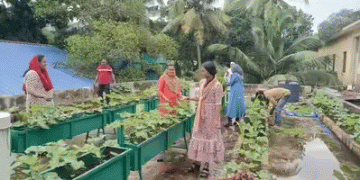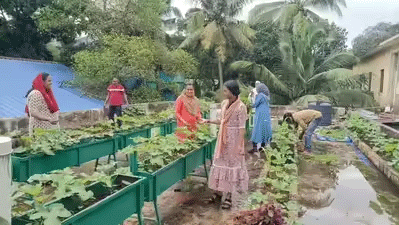In a powerful move to shape future agricultural and consumption habits, the Kochi municipality in collaboration with the Haritha Keralam Mission (HKM) has launched an innovative organic vegetable cultivation drive within its schools. This initiative, which began in select institutions like the Vennala Government UP School and the Ernakulam Girls UP School, is designed to be more than just a gardening project; it’s a hands-on educational tool to instill values of self-sufficiency, healthy eating, and environmental stewardship in students. With plans to eventually expand to all schools under the corporation’s jurisdiction, the program represents a significant investment in the agricultural literacy of the next generation.
The model relies on a collaborative partnership. The Haritha Keralam Mission provides the essential vegetable seedlings and oversight, while the respective Parent-Teacher Associations (PTAs) contribute by preparing the soil and providing the necessary infrastructure. This synergy between a government mission and community support is a key driver of the program’s early success. As Nissa Nishad, the HKM officer overseeing the project, stated, the goal is to boost the production of pesticide-free vegetables while allowing children to develop cooperation skills and share experiences with one another.
The produce from these school gardens is already creating a tangible impact. The vegetables are primarily used in the preparation of midday meals for the students, providing them with fresh, nutritious, and organic food directly from their schoolyard. Any surplus is then sold to the local community, creating a micro-economy and further connecting the school to its neighborhood. This “farm-to-school” model is gaining traction globally. A 2023 report by the World Food Programme highlighted that school garden programs can improve nutritional diversity in children’s diets and serve as a practical educational platform for sustainable agriculture, echoing the benefits observed in Kochi.
This initiative aligns with a broader national and global trend. In India, the National Education Policy 2020 emphasizes experiential learning, including gardening, as a part of holistic education. Furthermore, the organic food market in India is projected to grow significantly, from approximately $1.6 billion in 2024 to over $4.6 billion by 2029, according to industry analyses. Programs like Kochi’s are crucial for building a cultural foundation and future consumer base that understands and values organic production methods.
Kochi’s school garden program is a visionary project that looks beyond immediate vegetable production. It is an investment in human capital, aiming to cultivate not just crops, but a generation of informed consumers and potential farmers who value sustainability, health, and community cooperation. By integrating practical agricultural skills into the educational curriculum, the city is addressing food security and nutritional challenges at a grassroots level. For agronomists and educators, this serves as a compelling model of how to embed the principles of agroecology and organic farming into community life, ensuring that the knowledge of growing food cleanly and sustainably is passed on, one school garden at a time.































